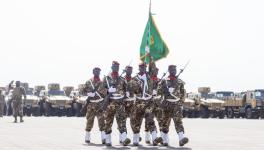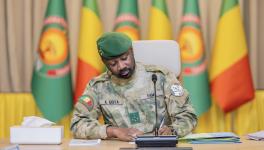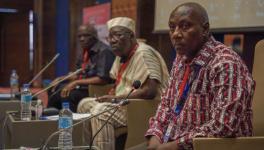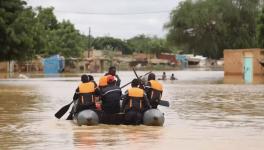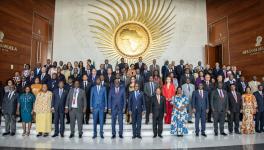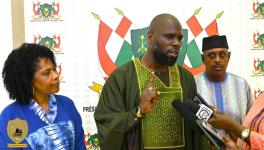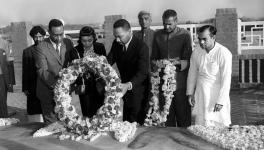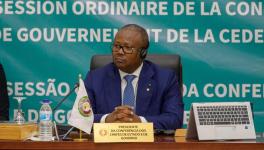French decision to withdraw troops from Niger is a testimony “to the determination and will of the Nigerien people”
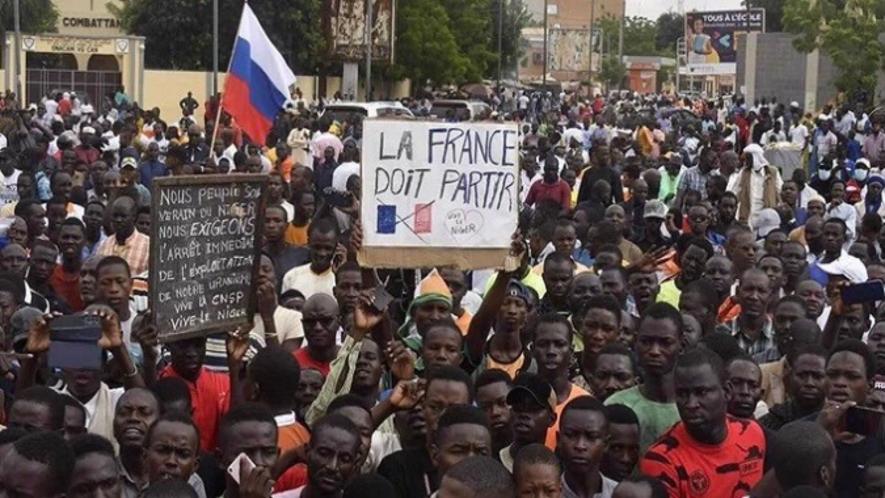
The people of Niger along with its military government have demanded France to withdraw its troops from the country.
French president Emmanuel Macron said on September 24 that the country will withdraw its troops from Niger. The announcement came after the country had refused to do so in a nearly two-months-long stand-off with Niger’s military government which ordered the French troops to leave the country soon after taking power in a popularly welcomed coup on July 26.
The withdrawal of its 1,500 troops will take place over “the months and weeks to come” and conclude by the end of this year, Macron said on Sunday.
France also decided to withdraw its ambassador, Sylvain Itté, who had earlier been asked to stay put in the embassy even after Nigerien authorities canceled his diplomatic card and visa late last month, and ordered the police to expel him. “In the next hours, our ambassador…will return to France,” added Macron.
“This Sunday, we celebrate the new step towards the sovereignty of Niger,” its military government, the National Council for the Safeguard of the Homeland (CNSP), said in a statement soon after. “It is a historic moment which testifies to the determination and will of the Nigerien people…Imperialist and neo-colonialist forces are no longer welcome on our national territory.”
The CNSP was formed after the coup on July 26, ousting former Nigerien president Mohamed Bazoum, who had welcomed more French troops and instituted a crackdown on the domestic protest movement against the French deployment.
Amid mass-demonstrations welcoming the coup and demanding the withdrawal of French troops, CNSP terminated the military agreements that had allowed France to deploy troops in Niger. The agreements entailed a one-month notice period which ended early this month.
However, French troops had continued to stay “in a position of illegality”, the CNSP-appointed Prime Minister, Ali Mahaman, had complained earlier this month. The former colonizer had refused to withdraw its troops on the grounds that it did not recognize the authority of the CNSP, insisting that Bazoum remains Niger’s president.
Even on announcing the withdrawal, Macron said, “We will consult the putschists, because we want this (withdrawal) to be done peacefully,” but maintained that France does not recognize the CNSP and continues to regard Bazoum as the “sole legitimate authority”.
Abdoulaye Seydou, national coordinator of the anti-imperialist M62 movement who had been imprisoned under Bazoum and released post-coup, had warned France late last month that “all the villages, all the surrounding communes will descend” on its base in capital Niamey, if its troops do not to leave. By the start of this month, protests demanding troop-withdrawal had become an almost daily event outside the French base.
France, however, had remained obstinate, and even extended support to the military action threatened by the Economic Community of West African States (ECOWAS) to restore Bazoum to Niger’s presidency. However, the regional bloc was beset with protests and domestic opposition to war in several of its member states.
The Senate in neighboring Nigeria, the strongest military power in the bloc, refused to support the deployment of its troops. The African Union (AU) also refused to support the French-backed military intervention by ECOWAS.
In the meantime, Niger was assured of military support by Mali and Burkina Faso, which, like Niger, were also suspended from ECOWAS and sanctioned after popular coups, following which their military governments ordered French troops to leave.
After entering into a defense pact, with an agreement that an attack on one will be treated as an attack on all the three, inviting a joint military response, the three countries went on to form the Alliance of Sahel States (AES) on September 16.
In an open letter to the transitional presidents of the three countries, the West African Peoples’ Organization (WAPO) welcomed the formation of AES, “as the beginning of the realization of the ideals of the Founding Fathers of Pan-Africanism including Marcus Garvey, W.E.B. Du Bois, Kwame Nkrumah, Sékou Touré, Modibo Kéita, Patrice Lumumba, etc.”
It called for devolution of “power to the masses through defense committees” in its letter to the heads of AES, one of whose objectives is to counter the “armed groups, irregular armed forces or mercenaries”.
France accused of supporting terrorist groups in Sahel
One of the reasons Macron gave for his decision to withdraw troops was that the Nigerien authorities “no longer wanted to fight against terrorism”.
However, Mali, which has lost several dozen soldiers in the fight against Islamist insurgency over the last year, including 20 only this month, had alleged in August 2022 that France had breached airspace more than 50 times that year and dropped weapons to terrorist groups. While France rejected the allegation, Niger’s CNSP also said on September 22 that France was financing and equipping terrorist groups in Sahel.
Over the last decade, Islamist insurgencies have spread across Sahel in the aftermath of the destruction of Libya by NATO’s war, in which France was a key participant. With the stated aim of defeating these insurgencies, France started Operation Barkhane in 2014. By the time the operation ended in failure last year, violence involving Islamist Militants had nearly tripled in the Sahel.
At its peak strength, France’s Barkhane force had 5,500 troops deployed in what was called the G5 Sahel – namely Mali, Burkina Faso, Niger and Chad, where it had permanent bases, and in Mauritania.
After withdrawing from Mali and Burkina Faso, and now on the way out from Niger, Chad is the last of the now practically defunct G5 Sahel countries to host a permanent base of France. While threatening military action against Niger ostensibly to restore democracy, France supports military rule in Chad. However, its future in Chad is far from secure, with a rising resentment against France and the military regime it is seen to have imposed on Chadian people.
Read: Under French-backed military ruler Mahamat Deby, Chad is a “pressure cooker waiting to explode”
Analysts have argued that more coups in region toppling regimes that are domestically perceived as French puppets might be further incentivized by the establishment of the AES, which is emerging as a potential security framework for such countries. Its founding charter states that the alliance is “open to any other State sharing the same geographical, political, socio-cultural realities.”
Get the latest reports & analysis with people's perspective on Protests, movements & deep analytical videos, discussions of the current affairs in your Telegram app. Subscribe to NewsClick's Telegram channel & get Real-Time updates on stories, as they get published on our website.










